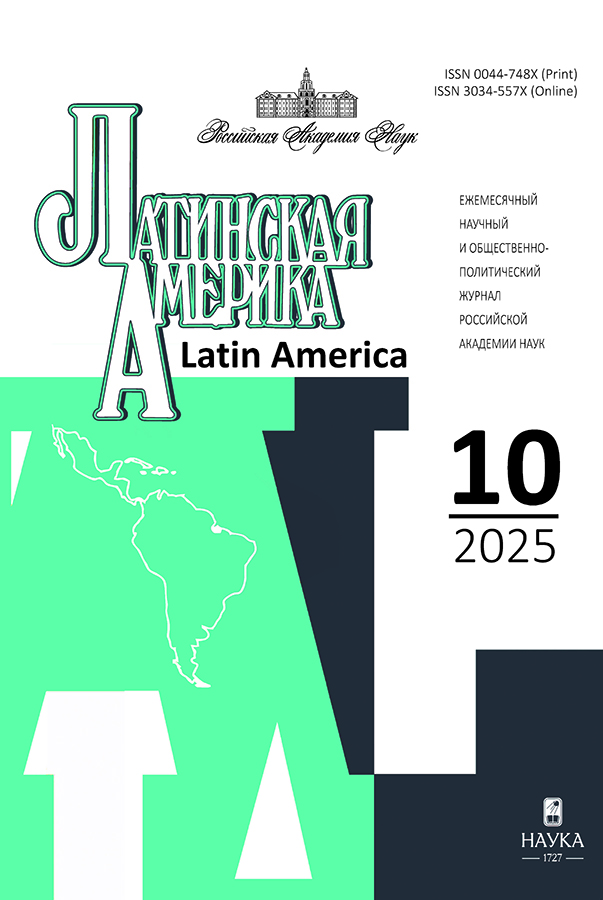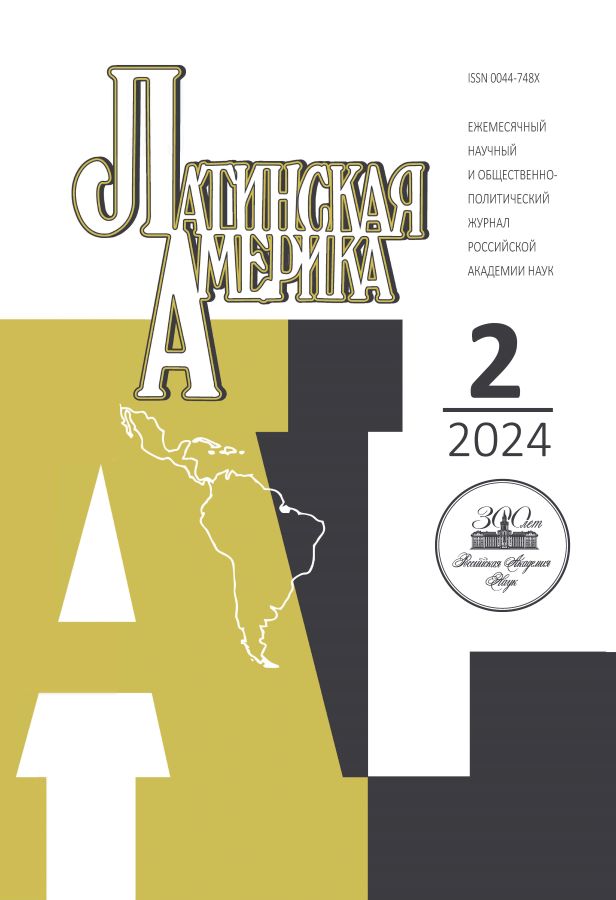№ 2 (2024)
Политика
Этнополитические конфликты в Мексике: аграрный и этнический факторы
Аннотация
В статье рассматриваются факторы этнополитических конфликтов в Мексике, являющихся неотъемлемой частью политического процесса, происходящего в стране. Социальные требования аграрного характера, обусловленные курсом на модернизацию сельскохозяйственного сектора и сворачиванием мер господдержки крестьянства, с 1970-х годов уступают место этнокультурной риторике, политизации этничности и апеллированию к праву на исконные земли. Данный тренд соответствует переменам в структуре политических возможностей, в том числе демократическому транзиту в Мексике и эволюции международного права, касающегося прав коренных народов и этнических меньшинств.
Латинская Америка. 2024;(2):6-20
 6-20
6-20


Преступные организации как субъекты неклассических войн и угроза государственному суверенитету Мексики
Аннотация
В неклассических войнах военно-политические цели достигаются без использования вооруженных сил или при их ограниченном применении. Криминальные мятежи являются формой неклассических войн, в которых преступные организации становятся основными субъектами наравне с государствами. Ситуация, возникшая в Мексике, является примером криминального мятежа. Фрагментация и «сетевизация» преступных организаций способствует их эволюции, что представляет угрозу национальной безопасности Мексики.
Латинская Америка. 2024;(2):21-39
 21-39
21-39


Международные отношения
Россия — Латинская Америка. Военно-технический фактор в контексте специальной военной операции
Аннотация
В статье проанализирована тема поставок российских вооружений в страны Латинской Америки в период с 2012 по 2017 г. в контексте попыток НАТО привлечь государства региона в качестве поставщиков вооружений украинской стороне в рамках Специальной военной операции (СВО). Рассмотрены причины кооптации латиноамериканских государств в конфликт. Выявлено пять уровней реагирования латиноамериканского сообщества на проведение Россией СВО, из которых высшим является уровень конкретных политических решений. Отказ латиноамериканских стран отправлять вооружения (в том числе ранее поставленные Россией) в зону конфликта следует рассматривать как наиболее яркий пример реагирования на пятом уровне и симптом стратегического нейтралитета как доминирующей равнодействующей реакции стран Латинской Америки на конфликт.
Латинская Америка. 2024;(2):40-50
 40-50
40-50


Иберийский аспект
Социально-экономические детерминанты центробежных тенденций в Стране Басков на современном этапе
Аннотация
В статье рассматриваются социально-экономические факторы центробежных тенденций в Королевстве Испания на примере Страны Басков в период с 2009 по 2020 гг. Выявляется связь между предпочтениями жителей Страны Басков относительно территориально-политического устройства Испании и рядом социальноэкономических аспектов: ВВП на душу населения, уровень безработицы и средней заработной платы, а также индекс потребительских цен. Публикация также знакомит читателей с отношением басков к региональному правительству и их оценкой экономической ситуации в регионе. Автор приходит к выводу, что одним из ключевых факторов становится индекс потребительских цен, так как с повышением цен усиливались и сепаратистские настроения. Важным является также мнение граждан о деятельности регионального правительства: несмотря на оценку экономической ситуации (плохая или хорошая), если отношение к региональному правительству положительное, центробежные тенденции становятся более интенсивными.
Латинская Америка. 2024;(2):51-61
 51-61
51-61


Конкурс молодых ученых
Место и перспективы развития CELAC в процессах латиноамериканской интеграции
Аннотация
Статья посвящена истории сотрудничества латиноамериканских государств в рамках крупнейшего интеграционного объединения региона — Сообщества стран Латинской Америки и Карибского бассейна. Особое внимание уделяется перспективам развития этого блока на современном этапе международных отношений и его взаимодействию с Организацией американских государств. Научная новизна исследования состоит в том, что в нем впервые за последние годы анализируются механизмы функционирования CELAC и нормативно-правовые документы, регламентирующие внутрии внешнеполитическую деятельность объединения.
Латинская Америка. 2024;(2):62-75
 62-75
62-75


Роль традиционного сектора энергетики в условиях нынешнего энергетического кризиса
Аннотация
Энергетический кризис 2021—2022 гг. стал причиной пересмотра энергетического будущего в большинстве стран мира. Политические партии Испании придают этому вопросу особое значение, осознавая свою роль в деле обеспечения энергетического благополучия страны. Лидеры пяти ведущих партий делают непростой выбор между традиционной энергетикой и альтернативными источниками энергии, нередко становясь участниками ожесточенных дебатов о сохранении и дальнейшем использовании традиционного сектора в стране. Тяжелые реалии современного энергетического кризиса серьезно влияют на непрерывный процесс сравнения двух видов энергии, вынуждая членов партий критически смотреть на энергетическую повестку дня.
Латинская Америка. 2024;(2):76-82
 76-82
76-82


Страницы истории
Проблема антарктических и субантарктических территорий во внешней политике Великобритании (1945—1951 гг.)
Аннотация
С окончанием Второй мировой войны британские политические круги рассчитывали на то, что Великобритания сохранит за собой статус крупной мировой державы. Поэтому важное значение придавалось восстановлению серьезно пошатнувшегося за годы войны влияния страны в латиноамериканском регионе. Определенную проблему для достижения этой цели представляли территориальные претензии Великобритании в Антарктиде, которые входили в противоречие со стремлением Аргентины и Чили добиться признания собственных антарктических секторов. Данная статья написана на основе документов Британского национального архива, большинство из которых вводятся в научный оборот впервые.
Латинская Америка. 2024;(2):83-96
 83-96
83-96


Руптуризм как социокультурный процесс в Чили в конце 1960-х — начале 1970-х годов
Аннотация
В конце 1960-х годов во многих странах мира прошли студенческие протесты, позже ставшие частью «культурной революции 1968 г.» В данной статье анализируется чилийский вариант этого явления — руптуризм, значительно повлиявший на всю последующую историю социума. На основе интервью свидетелей, а также газетных статей делается вывод, что руптуризм — это во многом ментальный поколенческий конфликт, который привел к разделению общества на сторонников старой и новой системы ценностей.
Латинская Америка. 2024;(2):97-103
 97-103
97-103


Размышляя о прочитанном
 104-110
104-110


Виталий Романович Доценко (1938—2024)
Латинская Америка. 2024;(2):111-111
 111-111
111-111












